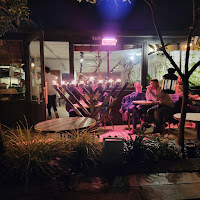As we close out 2022, I am overdue to put together another blog. I could probably devote this whole blog to political developments in Israel - but that would be a depressing post and would probably bore those of us you who are less interested in Israeli politics. So I have instead put together a smattering of items. Hopefully one or more will interest you. That's not to say that I will skip Israeli politics entirely - I certainly won't. But this will be more of one of those "stream of consciousness blogs" hitting on a few different topics. Hopefully it will all come together.
"Holiday Season" in Israel
This year, I came to Israel a bit earlier than usual in December since we had guests arriving for Chanuka. I usually tend to come back to Israel later in the month, once things quieten down in Toronto. For me, one of the nice aspects of being in Israel in December is the complete lack of Christmas and Christmas celebrations.
I don't mean that in a negative way towards those who celebrate. But in Canada, the November-December period is the time of year when I am reminded that I don't really belong. Decorations and trees are everywhere - in stores, office places, malls. The Second Cup that I go to in the mornings to grab a coffee starts playing all Christmas music 24/7 the day after Halloween. Is that really necessary? I guess if the majority of people enjoy it - then great. Even for people who fully embrace the holiday - I think they probably used to start getting ready in early December. Now the whole month of November has also become entirely Christmas oriented in many places.
I grew up in an environment in which in my early years the school I attended recited the "Lord's Prayer," (and forced everyone to do so) even though it was a "public school." We had Christmas concerts, Christmas Carols and other trappings of the ubiquitous Christian majority culture. As one the small minority who did not celebrate these holidays, I always felt that I just didn't fit in this time of year.
So for me, it is somewhat refreshing to spend this time in a place where things are completely different. Christmas in Israel, in most areas, is a normal work day. Everything is open and operates on a normal, non-holiday schedule. In some predominantly Christian areas, there are certainly festivities, decorations and celebrations. In Nazareth, Bethlehem, parts of Jerusalem and other areas, Christmas is celebrated actively. I certainly have nothing against that and wish everyone celebrating a Merry Christmas. But, around the rest of Israel, there is a totally different December atmosphere.
Although Chanuka coincides this year with Christmas, it is a relatively minor holiday. Some places have a Chanukiah set up for lighting (for example, this restaurant that we were at the other day - pictured above). But since it is not really a major holiday, most places haven't really done any decorating. No one is wearing ugly Chanuka sweaters in Israel (even though it is cold and rainy) and people are working as usual. Our visiting guests couldn't believe it since I think it was their first "holiday season" in Israel.
Our big holiday period is the September-October holidays - from Rosh Hashanah to Simchat Torah - or again over Pesach (Passover). During those time periods, many businesses are closed, there are festivals around the country and many people are off work, travelling or celebrating. I could imagine that Yom Kippur in Israel would feel very imposing to someone who is not Jewish since everything is closed. Though I don't know of any radio station in Israel that would start playing Yom Kippur and other high holiday music 6 weeks before the actual holiday.

In any event, I have been honoured to attend holiday celebrations with my friends in Canada - whether that is Christmas events, Diwali, or other religious occasions. And of course one of the great things about Canada is that people can feel free to celebrate whatever religious or other ethnic or cultural events they choose to celebrate. But the holiday season still reminds those who don't celebrate Christmas that they are very much a minority - starting as early as Halloween. I might add - that even in 2022 - Ontario, Canada is still a place where the government funds Catholic school education but not that of other religious groups. That's a bit of a digression but my overall point - simply - is that it is nice to be somewhere else for a change that time of year.
We did mark Chanuka by lighting the candles each night, eating some potato latkes, trying some donuts (I tried to minimize my consumption of the donuts...). But it was fairly low key.
We lit this beautiful Chanukiah that a friend of ours made.
Here you can see an example of some of the types of "sofganyot" (filled donuts, basically) that are sold this time of year.
And even though we actively try to minimize the frying - every once in a while (like during Chanuka and Pesach) - we do enjoy a few potato latkes. I like them much more than donuts personally. In fact, I'll admit that I like them too much - especially with home made apple sauce or fresh sour cream.
Unlike the custom for many American Jews and some Canadians, we didn't go out for Chinese food on Christmas Eve or Christmas Day. Partially, that is due my discussion above, that December 25th is more or less a normal work day here. But the other reason is that there are relatively few Chinese restaurants.
Nevertheless, we actually wound up going out to pan-Asian restaurant - "Queen Lu" in Ra'anana - which is a mixture of Japanese and Thai, coincidentally on Saturday night December 24. The food was quite good and the service was great. Queen Lu is a Kosher meat restaurant - so they have meat and fish dishes as well as vegetarian options.
Sports Comments
By far, the biggest event in Israel for the year - and probably for the past 4 years - was the World Cup. It was so huge here that the TV stations were wishing people a "Happy World Cup Holiday" throughout the tournament, even though Israel wasn't even participating. Thousands of Israelis flew to Qatar to attend even though they were not the most welcome guests. Qatar does not have diplomatic relations with Israel but allowed Israeli to fly direct to Doha just for the World Cup. Despite some anti-Israeli incidents that took place during the event, nothing major occurred (that I am aware of) and the Israeli soccer (football) fans returned safely.
Israelis were mixed on whether to cheer for Messi and Argentina or Mbappe and France in the finals - but I think, on balance, the pendulum was on the Argentina side and a majority of Israelis were cheering for Argentina and were happy to see Messi win. Sure there is a sense here (like everywhere else) that FIFA tournaments tend to be rigged. After all, the Qataris own the Paris-St Germaine club where Messi plays - and Qatar was hosting the tournment.....and Argentina (Messi's team) won even though they were not one of the top favourites to win. But all that being said, there were some fantastic games and I thoroughly enjoyed watching many of them. It was fun to see Canada play - even though our national team was not able to come up with a win. Canada did score its first ever World Cup goal and that was exciting.
Other than watching some international soccer, I am not really interested in the Israeli sports scene. But I am excited about some other sports and sports tournaments which are a bit challenging to watch here in Israel.
As you might know, the annual World Junior Hockey Tournament opens today in Halifax, Nova Scotia and Moncton, New Brunswick. For hockey fans - this is quite a big deal. This year's tournament features the much touted 17 year old - Connor Bedard - who is expected to lead the Canadian team and promises to be one of professional hockey's next great stars. Of course, trying to watch these games in Israel is quite a challenge - because of timing and difficulties in streaming the games. But I'm hoping to watch a few, especially towards the end of the tournament. I don't imagine that a huge number of my fellow Israelis will be watching - but that's their loss.
I am also super excited about the Buffalo Bills this year - who are among the top 3 teams in the NFL with only 2 games to play. Maybe this will be the year to exorcise those demons of the past - where the Bills played in the Super Bowl four years in a row (1991-1994) without winning any of them. As a Torontonian, I grew up travelling down to Buffalo periodically to attend games - in what has to be the world's worst professional stadium. But the Buffalo tailgate party, the fan enthusiasm and the general excitement often make up for the terrible stadium. We used to bring barbecues, kosher meat and other foods, a decent supply of beer and whatever else was needed to enjoy tailgating starting at 7 or 8 in the morning - even on snow days. Sometimes, the weather was so severe that we left early. But since Canada does not have an NFL team - Buffalo is really Toronto's "home team" and I would love to see them win.
I have also been watching the odd Toronto Maple Leafs game. The Leafs have one of the top records in hockey this year but Leaf fans know that hockey seasons usually end in disappointment. After all, the last Maple Leaf win was in 1967. Since I still have a share of Leaf season tickets - I am cheering for them - but I'm not yet convinced that this season will end well. Watching hockey from Israel is always a challenge since there is very little interest here and the times are less than convenient. But I have seen a few games - and during the playoffs I am willing to sacrifice some sleep to watch my favourite teams play. But that is not until late April - so I have some time.
Travelling Around
If you are planning to be in Israel - and looking for something fun to do with young kids - the Yodfat Monkey Forrest in north-central Israel features a large collection of squirrel monkeys that roam free in the park. Kids love feeding them (with park-supplied food). So do many adults.
The park also has a collection of other animals wandering the park including sheep, rams, goats, peacocks and pea hens, and a variety of caged birds including parrots and other talking birds. Nothing dangerous, as far as I could see. People spend about an hour and a half in the park, which closes most days around 3 p.m.
Right next door, there is a fantastic vegetarian restaurant, the Yodfat Cafe, which has a wide ranging menus of salads, pasta dishes, crepes, pizzas and delicious coffee. We have been several times and have never been disapppointed. Next to the park, there is a also a strictly Kosher bakery/cafe with take out baguettes, croissants and quiches, as well as a small food-truck style Kosher pizza stand.
There are also a whole bunch of interesting shops including a boutique wine store, a cheese shop, a sock store and a range of other interesting stores and galleries all right next door to the Monkey Forrest.
Israeli Politics
As you know, Israel held its fifth election in a period of four years on November 1, 2022. This time around, Netanyahu and his Likud party captured 32 seats which was not nearly enough on their own to establish a government in the 120 seat Knesset. However, political parties on the right that were prepared to support Netanyahu reached another 32 seats in total. That meant that Netanyahu was on track to put togher a 64 seat governing coalition.
At first, Netanyahu thought that this would be easy to do and might take "only days." However, it has now been more than 7 weeks and the government has still not been sworn in. Netanyahu has advised the President of Israel that he has reached agreements with his coalition partners and he is expected to swear in the government on Thursday December 29, 2022.
This version of Netanyahu's government will be the furthest right government that Israel has ever had. Netanyahu's coalition includes two ultra-religious parties (Shas and United Torah Judaism) and the Religious Zionist Party - made up of three ultra-right nationalist parties.
The coalition talks have been difficult for Netanyahu since each of of these five coalition partners have been demanding enormous concessions and Netanyahu has felt obliged to given in, presumably with the hope of getting out of his own legal difficulties in exchange.
Among the intended, reported agreements:
A change in the law to allow the Knesset, by a simple majority, to override any decision of the Supreme Court of Israel.
A change in the law to allow convicted criminals (like Shas leader Aryeh Deri) to serve as a cabinet minister without waiting for a seven year "cooling off" period.
A change in the law to allow "freedom of religion" to override anti-discrimination laws - examples provided include the areas of housing, medical treatment, the military and other areas. It is apparently targeted at LGBTQ+ people, non-religious women, Arabs and other minorities. If this is actually implemented, I would imagine it would create worldwide backlash against Israel, even among Jewish communities in countries around the world.
Changes to further deligimize Reform and Conservative Judaism in Israel (and worldwide) and to strengthen the power of the Ultra-Orthodox Rabbinical Authority.
Changes to the land, civil and military authority in Judea and Samaria (the "West Bank") to give significant power to the Otzma ("Jewish Power") party, led by Itamar Ben-Gvir and the Religious Zionist party led by Betzalel Smotrich. This will impact Palestinian housing decisions as well as decisions relating to the growth of new settlements. It will also impact a wide range of other decisions affecting daily life throught the disputed terrorities and the rest of Israel.
This is only the tip of the iceberg. In fairness, it remains to be seen which of these intended and announced changes will actually be implemented - by a government that has not yet even been sworn in. But I have no reason to believe or expect that the changes will only be "minor" or that these changes won't get implemented.
Overall, in my view, it is a very frightening government, moving us closer to countries like Turkey or Iran in which religious fanatics have signficant power over the lives of all Israeli citizens. One can only hope that all of the in-fighting that we have seen over the past 7 weeks (they haven't even been able to form a government yet) will continue to create dissonance that will prove too difficult to overcome.
To be clear - I think that is overly optimistic. This new government is likely to last for a while - and it is likely to cause signficant damage to Israel as a democracy, as a place that values the rule of law and as a place that welcomes Jewish people and others from all over the world as visitors and as potential immigrants. The retroactive legalization of different crimes including corruption, bribery and tax evasion, (by allowing those convicted of these crimes to serve as ministers), the legitimization of discrimination, the hand-over of power to nationalist extremists and religious extremists - and other intended changes to the law are all are all steps that should worry Israelis and Jews around the world who have been proud of Israel's accomplishments as a liberal democracy - even as one with warts and spots that inevitably accompany any country.
On the political front, I am hoping that 2023 will bring better news for Israel but I am not counting on it.
Wishing everyone the best of health, happiness, success and fun times in 2023.








